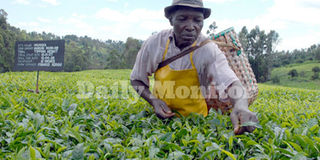Four companies set to start exporting tea

A man harvests tea. According to Uganda Export Promotion Board, 13 small-holder tea factories have been trained. File Photo
What you need to know:
- The tea companies selected and trained are Igara Tea Growers Factory, Buhweju Tea Factory, Kayonza Tea Growers Factory and Rusekere Tea Growers Factory, Dorothy Nakaweesi writes.
Four tea growers’ factories were assessed for the Goods Manufacturing Practice Certification (GMP) in preparation for Uganda’s direct export sales.
Iran, Kazakistan and other Central Asian markets are looking for Uganda’s tea. Once this development succeeds, it will not only brand the country but also boost its total export revenue collections.
Annually, Uganda exports more than 60,000 tonnes indirectly through Mombasa Auction as Kenyan tea. This arrangement has denied the country’s a tea brand image at the international market.
Ms Brenda Opus, the senior export marketing executive at the Uganda Export Promotion Board (UEPB), in an interview Prosper magazine, said: “We have trained participants from 13 small holder tea factories on the basic requirements for GMP certification. GMP is a key requirement for tea buyers in Iran, Russia and central Asia markets.”
The tea companies selected and trained are Igara Tea Growers Factory, Buhweju Tea Factory, Kayonza Tea Growers Factory and Rusekere Tea Growers Factory.
She added that the training involved the provision of hands-on technical advice in production and postharvest handling of exports as well as test marketing new export commodities and products.
Demand
According to UEPB, the Iranian delegation visited Uganda last year and in their discussions, they agreed that the buyers have an annual capacity to import more than 10,000 metric tonnes of tea from Uganda.
The other alternative to promote the country’s fourth-leading export commodity is to explore the possibility of setting up a Kampala Auction.
Mr Elly Twineyo, UEPB’s chief executive officer, earlier told Prosper magazine, that once this is achieved, Uganda will get other direct buyers of the country’s tea.
Besides Iran, other tea markets for Uganda are South Sudan, DR Congo, Turkey and Sudan.
Tea policy
The Assistant Commissioner External Trade in the ministry of Trade, Mr Richard Okot Okello, said lack of a tea policy to guide the sector is still a challenge.
Mr Okello said: “Without the policy, the sector makes monitoring difficult. Everyone comes to do what they think is right but this is destroying the market.”
He added that the policy will help to follow the value chain.




